I was 14 when my mom told me she was pregnant. Right away, I knew it would be a little brother. On the bus one day, Mom called and broke the news: “I know you’ll be disappointed, but it’s a girl.” Riley is still figuring out which is more accurate and has decided to try out “they” pronouns (a gender-neutral alternative to “he” or “she”).
Riley is now the same age I was when they were born. At 14, they are several inches taller than me. These days, they wear their hair short, somewhere between the ears and chin. It’s usually messy, and sometimes dyed a weird color. They’re a fashionable kid, taking inspiration for their clothes and makeup from the world of K-Pop. They’re a deft hand with eyeliner—it’s always on point.
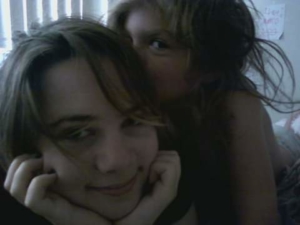 When they were a baby, I didn’t really want anything to do with them. I didn’t know what changes a baby would bring to our household, which was already tense with years of problems between my parents. I’d proven myself to be more of a troublemaker than my two older siblings, who had both recently left home. I earned myself a place in the police academy program at a nearby public high school because I “needed discipline.” Just a couple of days before the baby was born, I met my first long-term boyfriend, who would be part of my life, and the baby’s, for the next few years. He was three years older than me. My mom and I fought for days before she relented and allowed me to see him.
When they were a baby, I didn’t really want anything to do with them. I didn’t know what changes a baby would bring to our household, which was already tense with years of problems between my parents. I’d proven myself to be more of a troublemaker than my two older siblings, who had both recently left home. I earned myself a place in the police academy program at a nearby public high school because I “needed discipline.” Just a couple of days before the baby was born, I met my first long-term boyfriend, who would be part of my life, and the baby’s, for the next few years. He was three years older than me. My mom and I fought for days before she relented and allowed me to see him.
During her pregnancy and for a while after, my mom spent her life in fear. She was almost forty when she had the baby, and she had high blood pressure. Born six weeks early, Riley was tiny and had to spend two weeks in the NICU before being cleared by the doctors to come home. The first night in our apartment, Mom laid Riley in the bassinet that dominated the living room. They fussed so much that, before the sun rose, they were in bed with Mom. The two slept in the same bed until Riley was a teenager.
Welcoming a new baby brought relatives to our door. First, my mom’s favorite sister Suzi visited when Riley was about six months old. Later, Riley’s grandma and uncle on their dad’s side came. Pictures were taken, hugs exchanged, gifts received. I only have a few memories about this time. I was immersed in my own struggles, aching to spend every waking moment with my boyfriend. In a typical teenage fashion, I was completely egocentric and petulant, dealing with the depression that came with puberty while struggling to discover my own identity. Riley had sinus problems and was often sick. My mom and I still fought, but she focused her real energy on the baby, on the never-ending problems with my stepfather, on her own struggle with addiction.
Just before Riley turned one, I left the police academy, where I’d been miserable and short of breath all year. I went into independent study to finish high school, which was a much better fit for me. I spent several years in a nocturnal state, writing at night, sleeping in the mornings, and babysitting in the afternoons. During this time, I dabbled in prescription and over-the-counter pills, tried smoking a cigarette, and learned about sex. My boyfriend and I would babysit together, cuddling and kissing on the couch, Riley fixated on the TV. Whenever we went out, people assumed I was a teenage mother, which never really bothered me.
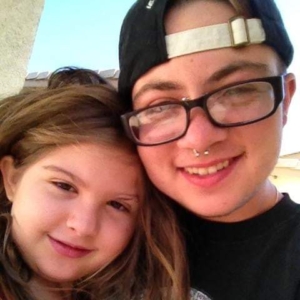 I remember Riley’s first big smile up at me as I sat in front of the computer, looking down at them in their little bouncy chair. I made squished eggs in the morning and plain pasta in the afternoons, annoyed at being the one to have to complete these chores. When my mom asked me to, I brushed Riley’s rat’s nest of hair, making sure their favorite show was turned on and they had a snack to get through it. I tried to be gentle. As a kid, I also had unga-bunga hair, so I understood the pain. Riley looked just like me when I was little.
I remember Riley’s first big smile up at me as I sat in front of the computer, looking down at them in their little bouncy chair. I made squished eggs in the morning and plain pasta in the afternoons, annoyed at being the one to have to complete these chores. When my mom asked me to, I brushed Riley’s rat’s nest of hair, making sure their favorite show was turned on and they had a snack to get through it. I tried to be gentle. As a kid, I also had unga-bunga hair, so I understood the pain. Riley looked just like me when I was little.
Riley and I were together with our parents in a situation that was often stressful and sometimes violent. Our mom and Riley’s dad fought often and hard. When this happened, I became the caretaker. My teenage angst was sidelined by these crises. I would take Riley into the bedroom, into my lap, and we would watch the Powerpuff Girls, or play Legos, trying to ignore the shouting from the other room. I was beyond fear by this point, used to the screaming matches that had been going on as long as I could remember, but Riley would whimper and cry and ask questions. I tried not to be too harsh with my answers, tried to remember that they wouldn’t understand the complicated reasoning behind my almost grown-up emotions and opinions. When I would occasionally interfere in these domestic disturbances, I felt puffed up, empowered—but also helpless. I was still a kid, older boyfriend or not. I tried to shield Riley as best I could. I tried to shield myself.
* * *
Besides being sick all the time, Riley was always an accident-prone child. Once, they slipped while climbing on the back of the couch and smashed their chin into the windowsill, biting through their bottom lip. I was babysitting at the time, and I was wracked with guilt. For once, my mom didn’t react with anger, instead understanding that kids sometimes get hurt. I was relieved she wasn’t mad at me for my negligence. Another time, Riley reached up and touched the electric stove while it was on, receiving massive blistery burns on three fingers. Just before I went away to college, a kid pushed Riley off the playground slide. When they hit the ground, their glasses sliced open their eyebrow. My mom sped to the hospital, then turned the keys over to me for the first time so I could park as she rushed Riley inside. Riley will always have that scar above their left eye. They never try to cover it with makeup, embracing the uniqueness it brings to their face. Their right thigh is a mass of huge scars from the time our big sister’s cat decided they were a threat and tore into their exposed leg. Riley is no stranger to physical pain.
I knew some things about Riley years ago. I knew they would be a dancer. Through all of the illnesses and injuries, they always had a mastery over their own body that I couldn’t really relate to. I knew they would question everything, empowered to explore the opportunities life placed before them. I knew they would experience many of the same things I did as a kid, like mental illness. No one could have convinced me, though, that we would be so much alike.
* * *
Riley’s father left when they were barely five. At that time, I was a college student with my own life and concerns. Our mom moved into a new apartment across the street from the old one, where rent was a constant worry. When I came home from school to visit, Riley and I would spend hours coloring or playing in front of the TV. We sang our souls out to The Backyardigans, and I introduced them to Hedwig and the Angry Inch. It may have been inappropriate for a kid, but we had a blast singing along to each subversive song. Music was everything to us, necessary in our TV shows and games. Early one Sunday morning, Riley and I lounged in bed and sang “opera” until the neighbors started yelling at us to shut up. We laughed for hours.
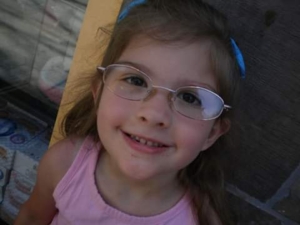 When the power was shut off due to nonpayment, our big brother came over. As night fell, we armed ourselves with Nerf guns, jump ropes, and sticks. Then, we divided the apartment into kingdoms: The Kingdom of Kitchen, Bedroomlandia, The Plains of Livingroom, Bathroom Swamp. Finally, we declared war on each other. Peeking around doorways, hiding underneath tables, and charging each other head on, we play-fought for dominance of the darkened rooms. Riley and I were both thrilled and enthralled that our big brother had decided to join us in this flight of fancy—and I was grateful, because Riley’s laughter echoed through the apartment, their fear of the power outage lost in the great fun of the impromptu session of imagination. We never had occasion to play Apartment Kingdoms again, but Riley asked us to for ages afterward.
When the power was shut off due to nonpayment, our big brother came over. As night fell, we armed ourselves with Nerf guns, jump ropes, and sticks. Then, we divided the apartment into kingdoms: The Kingdom of Kitchen, Bedroomlandia, The Plains of Livingroom, Bathroom Swamp. Finally, we declared war on each other. Peeking around doorways, hiding underneath tables, and charging each other head on, we play-fought for dominance of the darkened rooms. Riley and I were both thrilled and enthralled that our big brother had decided to join us in this flight of fancy—and I was grateful, because Riley’s laughter echoed through the apartment, their fear of the power outage lost in the great fun of the impromptu session of imagination. We never had occasion to play Apartment Kingdoms again, but Riley asked us to for ages afterward.
* * *
After college, I moved away for a couple of years. When I came back to Los Angeles, Riley was a preteen. They had grown even taller and looked much older. They were deep into their own life, just as I was at that age. It was different for Riley, though. I had been introverted and inactive, obsessed with my boyfriend to the exclusion of other friends, while Riley was dedicated to dance and seemed to have a new best friend every week. They were always going out to concerts or events, surrounded by a gaggle of dressed up teens.
Now that we live in the same part of town, we see each other more often. Riley is older, which makes our relationship different, more balanced. They’ve developed quite an irksome and entertaining personality. We’ve been able to spend time together one-on-one, reminiscent of the long days spent playing and singing when they were a toddler.
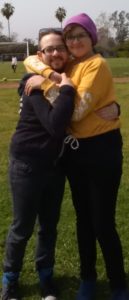 Last summer, Riley came over a couple of times a week so we could go swimming together. In my backyard surrounded by plants, statues, deck chairs, and the palpable presence of the sun, we would languish in the water. We cranked the radio, tuning in to our favorite alt rock stations, belting out the lyrics when Twenty-One Pilots came on. We played nonsense games reminiscent of Apartment Kingdoms, creating a plot worthy of publication. We sprayed each other with the hose as we took turns zooming down the big yellow slide into the deep end. When the time came to get out, we were equally reluctant, wishing we could stay in the cool safety of the water forever, living like mermaids. Even as I tried to act the grown-up and make Riley get out, all I could see in them was myself. Staying in the pool too long was my favorite act of defiance as a kid. I love the little things like this that tie us together, the little quirks that say we have a common history and family.
Last summer, Riley came over a couple of times a week so we could go swimming together. In my backyard surrounded by plants, statues, deck chairs, and the palpable presence of the sun, we would languish in the water. We cranked the radio, tuning in to our favorite alt rock stations, belting out the lyrics when Twenty-One Pilots came on. We played nonsense games reminiscent of Apartment Kingdoms, creating a plot worthy of publication. We sprayed each other with the hose as we took turns zooming down the big yellow slide into the deep end. When the time came to get out, we were equally reluctant, wishing we could stay in the cool safety of the water forever, living like mermaids. Even as I tried to act the grown-up and make Riley get out, all I could see in them was myself. Staying in the pool too long was my favorite act of defiance as a kid. I love the little things like this that tie us together, the little quirks that say we have a common history and family.
I remember the indifference and occasional resentment I felt toward Riley when I was a teenager, and I can’t connect to those feelings at all anymore. As different as we are, I can see those things in Riley now, the same emotions I battled as a kid. Depression and anxiety have set in, right on schedule. They’ve even enrolled in independent study, just like I did. My mom and I talk often about how frustrated and helpless we feel when we know Riley is in pain and there’s nothing we can do about it. I wish I could take away all the bad parts of their life, but I can barely keep swimming myself.
* * *
I guess if I want you to know one thing, it’s this: When life gets too hard to bear, when it seems like it’s all spiraling down to hell and there’s nothing you can do to stop it, I will be there, and I will rescue you. That’s a promise.
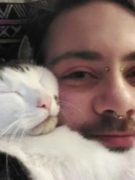 Adrien Kade Sdao writes young adult fiction and works in a children’s bookstore in Los Angeles. They are an MFA candidate at Antioch University, Los Angeles, and they are the lead editor for the Young Adult genre at Lunch Ticket. Their work has appeared in Lunch Ticket and Womanpause. They live in North Hollywood with their cat, Shelly.
Adrien Kade Sdao writes young adult fiction and works in a children’s bookstore in Los Angeles. They are an MFA candidate at Antioch University, Los Angeles, and they are the lead editor for the Young Adult genre at Lunch Ticket. Their work has appeared in Lunch Ticket and Womanpause. They live in North Hollywood with their cat, Shelly.




